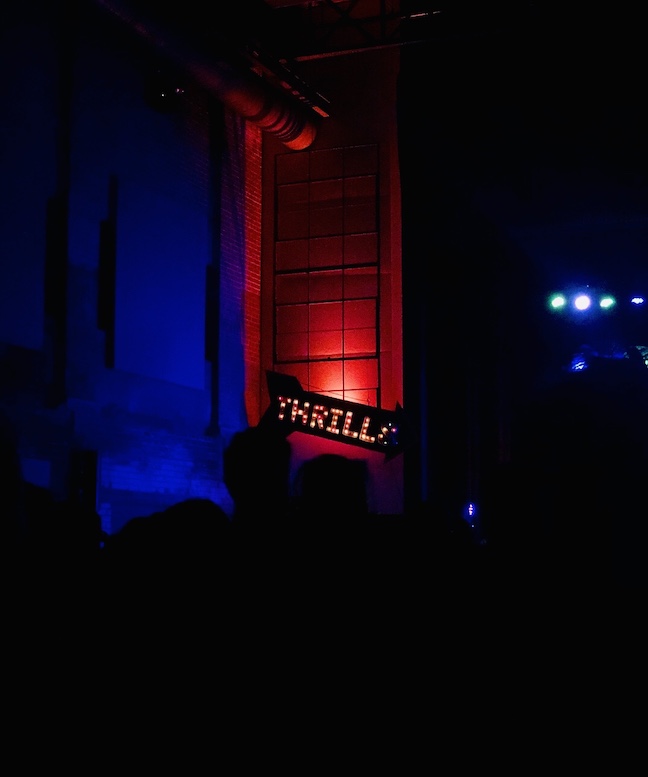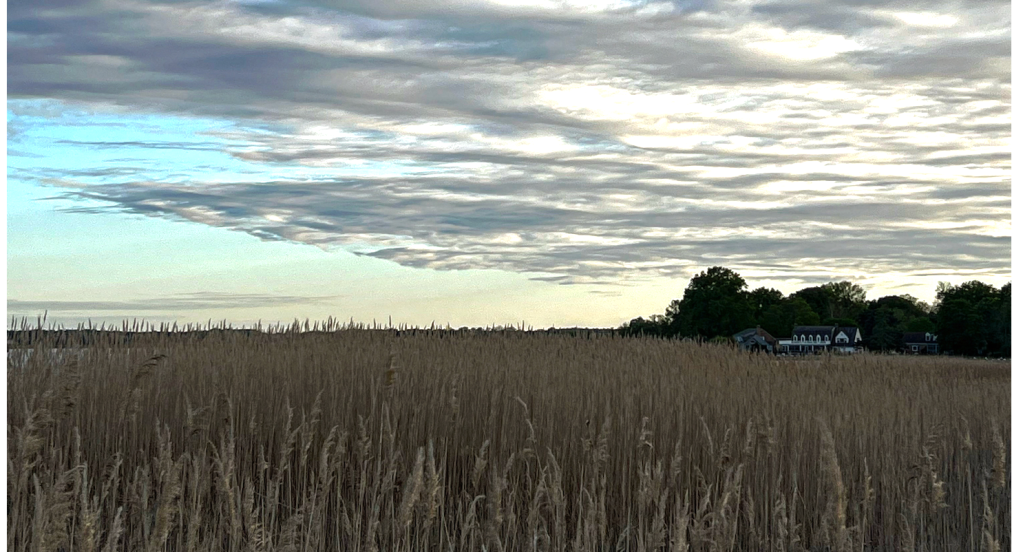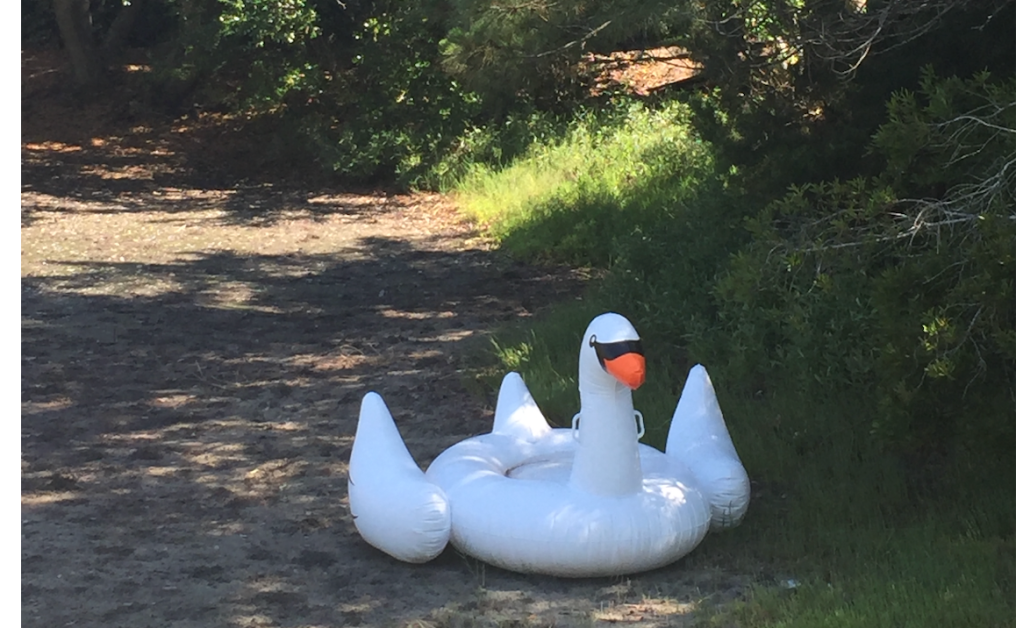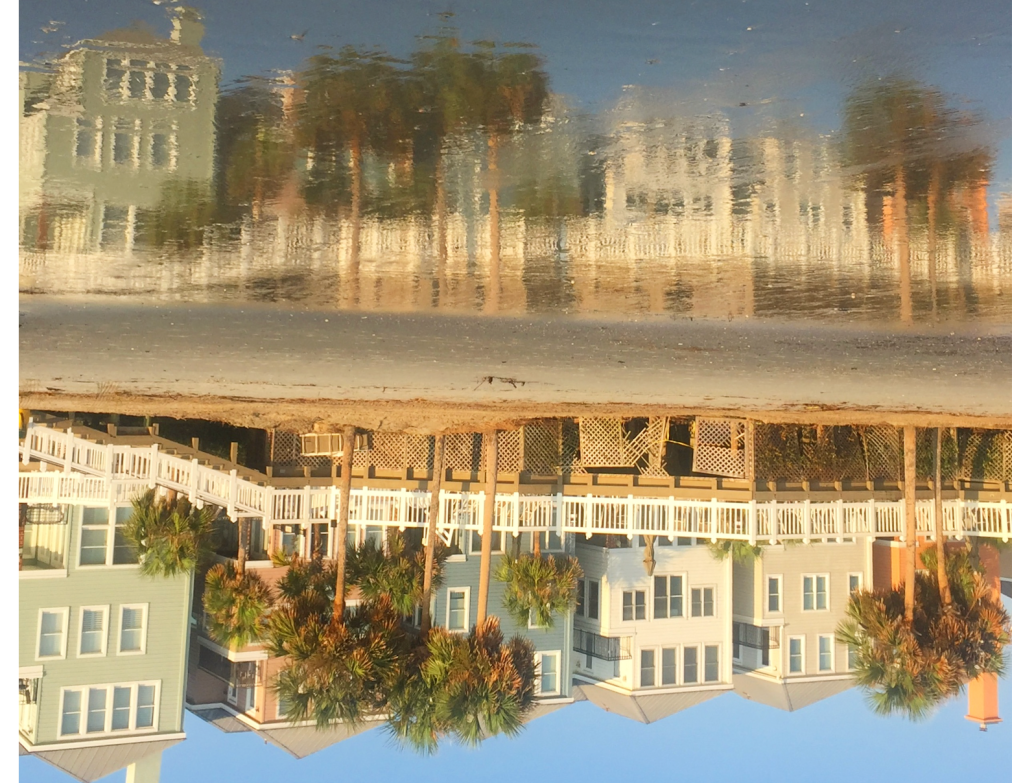In the beginning, the Radio Club had a radio station. It was a closet shaped room at the bottom of the stone stairs that opened like the mouth of hell under the old wrestling room and led to a concrete landing. To the left was a cinderblock storage room, home to long-abandoned student art and occasional band practice from the students most likely to get expelled. To the right was the day room, a brick cave that perennially smelled like old sweat, smoke damage and teenage boys. Some of the pubescent male funk may have seeped through the mats upstairs during the curiously intimate rites of violent masculinity performed each wrestling season. The rest came from the Day Boys, who in those days still outnumbered us Day Girls by a small margin, and some untold number of boarding students whose use of the right-side sofa and nook behind for hands-on sexual education encouraged advance knocking and loud I’m coming in, now, perverts.
It was rare to see people coming and going from the radio station. The general consensus seemed to be that they only really existed as a yearbook photo and vehicle to DJ school dances the administration was too cheap to outsource. Sometimes, during a free period, we might hear a bassline, or the mumble of a voice through the wall. This was the only evidence we ever had that the Radio Club was doing anything like radio. The station had a frequency number, but whenever we tried to access it, we heard only static. It’s a very small broadcast area. Just campus. Fair, but no matter where we put up an antenna—in the dorm common rooms, in the classroom building, at the top of the stone stairs, in the hallway immediately outside the radio station door, we could never get a signal. Like, are we sure the station is even connected? Like, maybe the administration turned off the signal years ago, probably once they realized it was easier than dodging faculty and FCC complaints every time some fourth-form edgelord tried to dedicate “Fuck Tha Police” to the Headmaster live on-air. It would be pretty crooked to pull the plug on free expression without ever telling the people doing the expressing that you had. But those were exactly the kind of Machiavellian shenanigans we expected of grown-ups (in general) and school administrators (specifically), which probably accounts for why that theory picked up such traction. The Day Boys were particularly fond of it. I’d see them swaggering past the Radio Station door, shaking their heads with pity, like, Poor bastards don’t even know they are just playing records and talking to themselves about music. Nobody’s listening. I remember thinking, that sounds pretty dreamy. Maybe I should join the Radio Club.
II
I’d known most of the Day Boys years before I started at Boarding School, because they lived in my neighborhood. A few straggled in from the rural counties that, unlike my own, actually looked and behaved like Appalachia. A few came from the local Catholic School. Most came from the same public schools I had, places without day rooms, where no one in their right mind would dream of leaving their backpack unattended or locker unlocked. I knew exactly what flavor of fuck-up they were long before the Dean of Students stood on a small dais in the middle of the Day Room, her hand trembling with wrath, as she pointed to the still smoking, ash-blackened remains of the sex couch and asked which one of them had set it on fire. “Have the self-respect to turn yourself in now or tell me who did, because I promise I will find out.”
The Day Boys took her tirade with almost Zen-like tolerance, without a single incriminating smirk. She exited threatening vengeance for the incinerated furniture. We knew it was an empty promise. I don’t know which Day Boy burned the sofa. It might have been the one that drove me to school every morning and never spoke to me. It might have been the one with the curls that every girl in the spring play went moon-eyed over. It might have been the one that just shrugged when the Dean left and said, “I mean, it smelled like cum and was infested with ants. It’s not like anyone in their right mind was gonna sit on it.” It might have been the one I’d known since I was ten, when he observed me feeling left out at his sister’s birthday party and challenged me to the first of several games of Battleship on a rainy fall afternoon. It didn’t matter. The Day Boys had coalesced into a collective. In some sense, they had all burned the sofa.
III
The Day Girls had little time for the Day Boys. The school boasted a wide variety of young men with a wide variety of exotic haircuts, accents, favorite bands, and passport colors. There seemed little reason to hang out with, say, the guy that used to kick your seat while reciting long passages of Eddie Murphy’s “Raw” in the back of your mom’s car on the way to sixth grade summer band, when there were, like, four other continents in the mix. I was into this boy with skinny arms and a curtain of bangs that I interpreted as somehow poetic. And by into, I mean, into. I mean, critical, irrational, embarrassing infatuation so intense that I’d shelved any reservations about him being a moralistic theatre kid who over-articulated every word and took everything very, very seriously, because he’d walked into the first day of a creative-writing extracurricular in Chuck Taylors and an old R.E.M shirt with guitar hands and a tattered volume of James Joyce shoved in his tattered jeans pocket, talking about words like other people talk about sex and said, as I fluttered and flushed and complimented his story, that you seem to have a hard time making eye contact with me which was weird kind of creepy but I was fifteen and when I looked at his eyes they were so blue and Girl, let me just tell you.
When it hits like that—like a fucking anvil made of sparkles, butterflies, and pure hormones–you tend to forgive a lot, up to an including the fact that cool Work Tour t-shirt aside, Poetic Bangs had the musical taste of divorced Dad at a fern bar. So I listened Paul Simon and Dan Fogelberg, stayed late for Amnesty International, and sat transfixed as he sat on the theatre stairs strumming original acoustic ballads about deforestation and new age spiritualism, oblivious to the fact that there were at least four or five other girls hanging on his every stupid word, as infatuated as I.
Poetic Bangs wasn’t the boy I was supposed to like. I’d spent the year previous in public school cultivating a quiet, black ballpoint pen-doodled crush on this quiet, black-haired skateboarder that sat across from me in Civics class and writing stories in the margins of my notebook about decrepit big city dystopias full of quippy revolutionaries with punk rock haircuts. I didn’t think I’d be spending my sophomore year listening to Poetic Bangs’ favorite Billy Joel songs and trying to compose piano ballad that would express my undying devotion to him. The only thing more embarrassing than the intensity of my crush was the person I was becoming within said crush. I’d have these moments of clarity, fleeting though they were, and think, this? This is what I want?[1]
Reader, it was.
IV
Everybody was in the winter play that year, even a few of the Day Boys. I tried to do my homework in the green room and not hang desperately on Poetic Bangs’ every word. He liked to play improv games, which usually ended with him kissing a girl. Somehow that girl never ended up being me. I mulled over it a lot. I bought more of his favorite records. I learned four chords on my mother’s old guitar and played them until my fingers blistered. I read the books he talked about. At that point, I still believed I could make a boy love me by imitation. I had yet to figure out that there was, perhaps, a crucial difference between wanting someone and wanting to be like someone. That realization came years and several unfortunate forays into hardcore and beat poetry away. At fifteen, though, I was too busy trying to cleave to his narrow tastes to stop and figure out my own.
We were in the green room sometime in January. Poetic Bangs had just slid onto the old orange sofa between me and another girl and just leaned over and kissed her hard, just to see what would happen. She blushed, clearly shocked, but didn’t slap him, which I innocently, jealously took to mean she’d liked it.
The Day Boys showed up in a clamor, and I was happy for the distraction, because it reminded me of all the noisy why not? days that preceded the dull myopia of unrequited love. They’d decided to test out the old stereo moldering away in the corner. They thought a few tunes might shake things up. None of us had the heart to mention that things were pretty well shook by the whole spontaneous kissing thing, and Poetic Bangs predictably told them they shouldn’t do it, that some of us—he pointed at me, I’m sure I glowed at his acknowledgement–were trying to study their lines and take practice seriously. The Day Boys had exactly zero time for Poetic Bangs and ignored him, experimenting with speaker wire and power cords,. Once the light came on, they shoved a cassette as Poetic Bangs sighed like a disappointed parent. You’re just going to get in trouble, said Poetic Bangs.
The room filled with the opening chords of Nirvana’s “Smells Like Teen Spirit.” I’m pretty sure it’s the first time I’d heard the song; it was certainly the first time I registered it for what it was. It was catchy and crunchy, and I’d always had a weakness for minor chords played fast and loud. I looked over to check Poetic Bangs’ reaction, hoping he’d like it, so I could like it, but he scowled, this song makes fun of everything I care about. And the Day Boys just grinned, like, yeah, that’s what makes it so fucking great, and turned it up until my ears hurt and I could hear it in my teeth. They managed to get in about twenty seconds of joyously pogoing around the room before the Drama teacher screamed in and pulled the plug and threatened them all with detention.
V
In the high school movie version of events, I’d have walked away from Poetic Bangs because the Day Boys were more obviously more fun and definitely had better taste in music and one of them probably would have been played by John Cusack in a Clash t-shirt. I didn’t, because I was an idiot who didn’t know herself. Also, the Day Boys were jackasses. Not a Lloyd Dobler among them
At the school, all of the students were expected to give a small regular donation toward OxFam, to help the starving children. This was likely to instill some trace notion of social responsibility, which for the class of people typically associated with boarding school, would henceforth be framed as a tax-deductible charitable donation, ideally to the school’s own annual fund. But we weren’t all bound for philanthropist-level wealth, and the Day Boys took particular umbrage at being asked. They’d been on collection strike for several months when the Dean called another meeting in the Day Room to chide us for our collective failure to raise even a desultory fiver for the less fortunate. Every other dormitory, every other hall, every other group of students has a 100% participation rate, and you Day Students have barely donated anything. She brought Poetic Bangs with her, as a representative of the campus philanthropic community. He gave an earnest speech, reminding us of how fortunate we were, while children were starving. The Day Boys chuckled, self-satisfied, and saw Poetic Bangs make eye contact with the back of the Day Room door, upon which an installation of sorts had been erected, a collage of trash and speech bubbles parroting school demands for donations encircling the head a Baby Jesus-style illustration of a starving child like a halo. It was grotesque and offensive, like most of the things the Day Boys found hilarious, but in the split second he saw it, before he had the space to perform theatrical indignation, I watched Poetic Bangs suck on his cheeks to stifle a laugh. The dean, barely civil with inchoate rage, could not even fully process the back of the door. “I will find out who burned that sofa,” she said. “I will figure out who keeps stealing the clocks. And when I do, all of you will be sorry.”
Two days later, the last remaining sofa in the Day Room mysteriously caught fire.
VI
I found myself alone in the campus post office with the only girl I knew for sure was in the Radio Club. She was a senior from Washington, DC, which seemed very cool to me, and wore lipstick just barely far enough away from black to pass dress code. She sat on the table beside the mailboxes, legs dangling, thumbing through last month’s Spin. A blue-haired Kurt Cobain in a green shirt and sunglasses stared out at me from the cover. She saw me looking and asked if I liked them. I looked around to make sure Poetic Bangs wasn’t around and nodded. “You want it?” she asked. “I’ve already read this one.” I took it from her and said thanks, because I couldn’t quite find the words to ask her about the radio club and whether the station was real or hypothetically, how a person like me might join.
VII
The weekend before Valentine’s Day, the Radio Club hosted a dance in the Day Room. They moved the furniture away, slid the dais into the corner like a DJ booth, and played off a stereo on the old test proctor’s desk. The Day Boys stayed away. In fact there weren’t many Day Students there at all, because why return to school on a Saturday night? But I had come in a furry, fuchsia sweater, which I believed to be the prettiest thing I owned ,trying to find Poetic Bangs. I had some notion that night that something huge might happen. I interpreted it as he will realize he loves me. In actuality, it was I will slip and fall down the stairs, smashing my face up and getting a concussion in the process after realizing he doesn’t love me and never will.
Before all of that though, I stood at the edge of the crowd of dancers in the dark, sweaty day room, watching the flashes of colors in shirts and the dimmed dance lights at the DJ station reflect in the dark windows across the northern wall. I didn’t see any friends. I didn’t have a dance partner. But it wasn’t music that required one, and whatever Radio Club representative behind the table was playing “Temptation” by New Order, which had, in the days before Boarding School and Poetic Bangs, been one of my favorite songs precisely because it conjured some vague sense of the teenage life I thought I wanted to have. I wasn’t sure I was still allowed to like New Order, because it didn’t strum earnest chords on an acoustic guitar, nor did it snarl in fury and threaten to tear the room apart. Like most great pop songs, it bubbled up beneath me until I felt I rode weightless on crest of a wave that could carry me anywhere I wanted to go instead of careening toward inevitable disaster for long enough to dance badly in a dark room with mostly strangers singing Up, down, turn around Please don’t let me hit the ground as I half bounced breathlessly in place. Oh, you’ve got green eyes/Oh, you’ve got blue eyes/Oh, you’ve got grey eyes.
When the song ended, the DJ put on one I would recognize the song week later, watching Teenage Fanclub play “SNL,” as “The Concept.” It would end up becoming one of my favorite songs for a while.[2] But at the time it was kind of a mood killer. The crowd cleared the dance floor, skulking off into the corner where the sex couch used to be. I remembered why I was there and turned to leave. I passed the girl from the Radio Club in the landing. The door to the station was open. I saw light, a table, some cords. She was balancing an orange milk crate full of CDS on her hip.
“Weird choice ,”she said of the song playing in the Day Room. “Don’t worry. I’m going to play something more dance-y. You should stick around.”
I think I told her I was going to get some fresh air. That sounded logical and she nodded. Even in February, it was swampy in the Day Room. I said I’d be back. I half-meant it. Poetic Bangs wasn’t big on school dances, but perhaps he’d consider it. Maybe somebody in the radio club had Thompson Twins or OMD or Peter Gabriel or whatever song played in the movies when a crush had a happy ending.
I wish I’d stayed.
Coulda. Woulda.
Maybe Radio Club girl played Beastie Boys. Maybe she played The Cure
VIII
Sometime in the spring semester, the school drew up plans for a fancy new dining hall and student center to stand on the site of the old wrestling room, beside the arts building. They’d have to tear down the old building, including both the radio station and the Day Room. And thus, when we returned from Spring Break, not only was the Day Room inaccessible, it was gone.
Day Student lockers were moved to the first floor of the class room and over the next few semesters we were granted provisional use of various underutilized classrooms, and briefly the faculty lounge, before it was decided we didn’t need a Day Room at all. At each of these announcements, I swore I saw a flicker of triumph in the Dean’s eye. She’d bested the Day Boys, moving them inch-by-inch closer to her own office, until they had no place to hide. By the time I was a senior, we had no place at all save a classroom hall full of messy lockers
The Radio Club existed, in theory, through the end of the year. When the school hired a local band to play the prom and they blew the power on half of campus, with the first notes of their first song (a cover of Red Hot Chili Peppers’ “Under the Bridge”), members of the radio club were dispatched to try and salvage the situation. And we hundred odd teenagers in uncomfortable formalwear sat in the murmuring in the darkness until they were able to find enough batteries for a boom box. They gave it their best with Prince and De La Soul but the stereo sounded impossibly small and tinny under the gothic arches of the dining hall without an amp behind it.
I went to prom by myself that year in baby pink damask Jessica McClintock, which was maybe the last time I ever wore that color of pink. I sat with a couple of friends in the dark and tried to make out Poetic Bangs and his date across the room. We didn’t have much to say to each other. I still pined for him. I couldn’t help it. A few weeks, when he graduated, I wrote him a shitty, passive aggressive note. He responded by sending me a letter basically telling me that he hoped we never saw each other again. We did actually see each other again, but it was such a brief nothing of an encounter that I imagine it never happened.
I got over him.
I found new crushes, new heartbreaks, and whole vast universe of songs to soundtrack them all. I never did join the Radio Club though. When I came back Junior Year, it, like the Day Room, had disappeared, as if it had never existed at all.
_____________
[1] A couple of years later, I was so caught up in embarrassment over my crush, the way my crush played out, and the person I had a crush on, I could barely bring myself to talk about it. We turned in journals for English class, ostensibly to provide commentary on reading, but my teacher senior year was this salty, brilliant woman who was old enough to be my grandmother, but I loved her. I wrote about everything in my journal. She gave plenty of advice and book recommendations in the margins. When I finally wrote this long, incredibly tortured entry about the crush, its aftermath, and how humiliated the whole thing made me feel even years later, she responded simply, “Poetic Bangs could have been anyone’s Heathcliff. Don’t be so hard on yourself.”
[2] Enough so that twenty-seven years later, I would stand in a crowded ballroom in a renovated mill, singing along as the band played it for a whole room of middle-aged people drunk on shared nostalgia almost as heady as a New Order song when you’re not quite sixteen.




